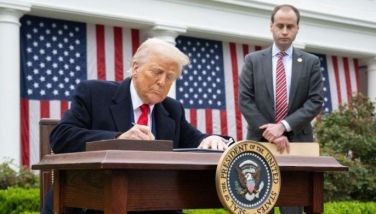Wary of war
In a luncheon event of select CEOs during the APEC Summit, the president of one of the largest manufacturing companies in China was sitting in the panel. He was asked from the audience about geopolitical risks and his take on whether events mean China is gearing for war. He replied, “Are we going to war?”, stated in a manner that was perhaps unexpected that it elicited some laughter from the distinguished audience. Then he said, “But, I do not think war is a laughing matter”. It produced seconds of silence. I thought at that moment I would hear it if a pin dropped.
Historically, we can say that China, as a people, is a product of centuries of war. From the earlier centuries to the early 1900s, more than a dozen dynasties ruled China. Each dynasty then was ceaselessly being attempted to be toppled by rebellions and internal wars. When a dynasty would have its people in mind, such as the Ming dynasty, relative peace was ushered in and the economy, culture and arts would flourish.
China got engaged in war against a First World country then. That was against the British government during the Opium Wars between 1840 and 1895. (Opium was being banned entry into China, but later on China became a major producer of opium.) This war resulted to relinquishing control over Hong Kong to the British government.
The Boxer Rebellion during the onset of the 1900 sought the expulsion of foreigners and Christianity. For me, it is impactful because it seems to be the predecessor of Mao Tse-tung’s closed-door policy. What was known to have helped topple the last emperor though was the Kuomintang, which was obviously anti-monarchy. And today, it is perhaps a bit odd for us to know that China had a government with a Western influence of democracy.
China picked up on the communist ideology quite early on, almost as soon as Russia introduced it to the world. But when the Communist Party of China succeeded into government, the Chinese Civil War happened in 1927, as a physical battle between ideologies. That civil war took a break and forged a strange alliance to fight against the Japanese invasion. Twenty million civilians died in that atrocious occupation of the Japanese forces. Soon after Japan was defeated by Allied Forces, the Chinese Civil War resumed full scale until 1950, and that produced Taiwan.
As recent as 1966, China was still in some kind of internal war as Mao Tse-tung launched violent purging activities to have a system under true communist ideology. It was said that this went on until 1975, or even shortly after the death of Mao Tse-tung; then China’s economy opened up.
Historical data will attest that China is one of the most successful countries in reducing or eradicating abject poverty. From a high of 60 percent of its people in poverty in 1980, it now registers a poverty rate of only five percent of its total population of more than 1.2 billion (one out of every five people in the world is Chinese). True, credit the opening up of the economy to foreign investment, and massive infrastructure development at a speed the likes of which the world has never seen. But what cannot be ignored are its people, traumatized by wars that brought unbearable tragedies in the family, but molded well by the day-to-day hardship and difficulties of putting food on their table in a land where they always stand up from battle, attack, war, or violence. The weapon of their choice is entrepreneurship.
Their entrepreneurial success comes from a no-option situation. Freedoms and the fringe benefits of a true democracy cannot be eaten – or at least, that is certainly true in China. Our professional colleagues in China do not have Facebook. They need to go to Hong Kong to upload pictures and catch up with Facebook friends. The level of acceptance of this situation is helped by the fact that the current system has brought China to where it is now – a global economic power.
So what about the fact that their students are taught that their sea should be in proportion to the size of their land; and that because they pioneered in trade using the vast waters of the Pacific, that they have territorial rights over it? What of the military posturing against its neighbors and now passively against US warships enjoying a stroll and a breath of fresh air in this marine-diversified and mineral-rich region?
I think the Philippine government’s position is quite sound. The relationship with China has many aspects, and territory is just one of them. As powerful as China is now, I believe it will eventually concede, not to international opinion, but to the force of an official ruling from the United Nations. Sanctions will hurt everyone economically, but the country with the most number of people to feed will be hurt the most. From what I have seen from China, a major reason for its success and domestic support is that it has a government that feeds its people. It’s most important lesson from its own history is: prosperity is only possible when there is harmony.
Never mind those personalities who say World War III has started. If that is ever true, there is no need to count what war number it is – it will be the final one for all mankind. There are important wars we need to fight today: hunger and poverty, terrorism, racial discrimination, to name a few. The only spark every person on this earth cares to see today are those firecrackers that light up half the sky with big letters that spell P-E-A-C-E.
Happy Chinese New Year to all our Chinese friends!
* * *
Alexander B. Cabrera is the chairman and senior partner of Isla Lipana & Co./PwC Philippines. He also chairs the Educated Marginalized Entrepreneurs Resource Generation (EMERGE) program of the Management Association of the Philippines (MAP). Email your comments and questions to aseasyasABC@ph.pwc.com. This content is for general information purposes only, and should not be used as a substitute for consultation with professional advisors.
- Latest
- Trending


























